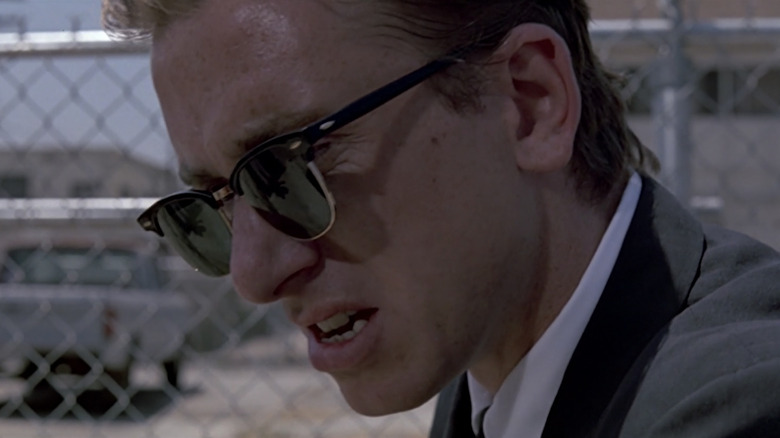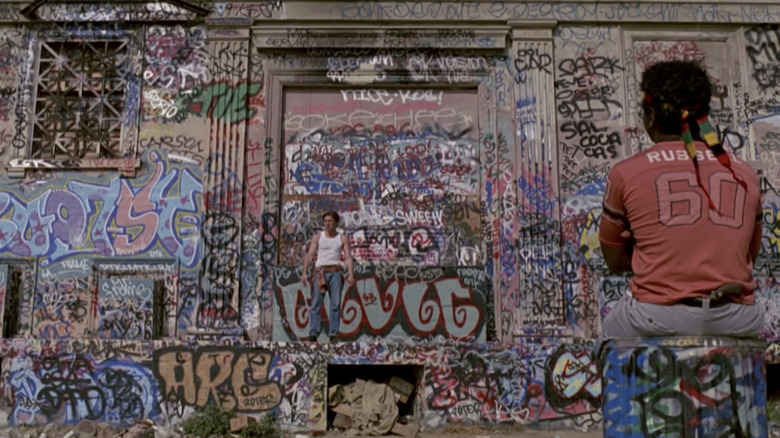How One Night Of Drinking Landed Tim Roth His Reservoir Dogs Role
For actors like Tim Roth, auditioning for a role in a movie can be as nerve-wracking as any job interview. Maybe that's why Roth described himself as "crap" at auditions and was reluctant to do one for Quentin Tarantino's 1992 directorial debut, "Reservoir Dogs." It only took a few drinks at a pub and some convenience store beer to loosen Roth's inhibitions and get him and Tarantino acting out the screenplay.
Roth's character in "Reservoir Dogs," code-named Mr. Orange, is an undercover cop who infiltrates a gang involved in a jewelry store heist. "Reservoir Dogs" is famously a dialogue-heavy film where the heist happens offscreen. It only lives in the viewer's imagination, based on how the characters describe it in the aftermath at a mortuary warehouse. It's a place where the threat of violence simmers below every interaction and where the specter of death hangs in the background via coffins and a funeral hearse.
Looking back on "Reservoir Dogs" for its 25th anniversary in 2017, Roth told Entertainment Weekly that he found Tarantino's script immediately engaging. He said:
"Within 20 pages, I was going, 'Oh, I want to be in this.' It's so beautifully written. It's so keenly and intelligently written. And it's also very funny."
Roth met with Tarantino and Harvey Keitel, who helped shepherd "Reservoir Dogs" as co-producer, in addition to starring as Mr. White. At this point, Roth was still hesitant about auditioning, and it wasn't until Keitel departed and Tarantino and Roth started drinking that they found themselves at Roth's home, doing a read-through — or ten — of the "Reservoir Dogs" script. As Roth recalled:
"[We] proceeded to read the entire script... every part in it about 10 times because we were hammered by then. And that's how I got the job."
'To do this job, you gotta be a great actor'
In the "Mr. Orange" chapter of "Reservoir Dogs," we see Roth's character undergo his own acting process in flashbacks, as his handler, Holdaway (Randy Brooks), coaches him on how to ingratiate himself with the other gang members. On a rooftop, Holdaway encourages Mr. Orange, whose real name is Freddy, to get in touch with his inner Marlon Brando by memorizing a "scene" or story that he can share with the other criminals to gain street cred. "To do this job," Holdaway says, "you gotta be a great actor. You gotta be naturalistic."
As Mr. Orange holds his script pages, they proceed to hash out the details of "the commode story," which Holdaway describes as "an amusing anecdote about a drug deal." It's a joke that Mr. Orange has to learn and make his own, the way an actor would.
First, we see him rehearsing it in his apartment alone. Then, we see him performing it for an audience of one (Holdaway) on a graffitied outdoor stage, as if he's doing Shakespeare in the urban jungle. Soon, he's telling it to Mr. White, gang leader Joe Cabot (Lawrence Tierney), and Cabot's son, Nice Guy Eddie (Chris Penn), in a bar.
As he feeds them this invented scenario, it comes to life onscreen, with Mr. Orange bringing a bag of marijuana into a public restroom where four sheriffs — analogues to the four criminals — have their own story going, while their drug-sniffing German Shepherd looks on. Through sound design, sensory details like the hand dryer's jet-engine roar become realer than real, highlighting the power of movie magic and human storytelling.
Tarantino also starred in "Reservoir Dogs" as Mr. Brown. To think that he and Roth first acted out these scenes while they were drunk adds another meta layer to the production of "Reservoir Dogs," since Roth was an inebriated actor pretending to be a cop while pretending to be a criminal in a bar.

